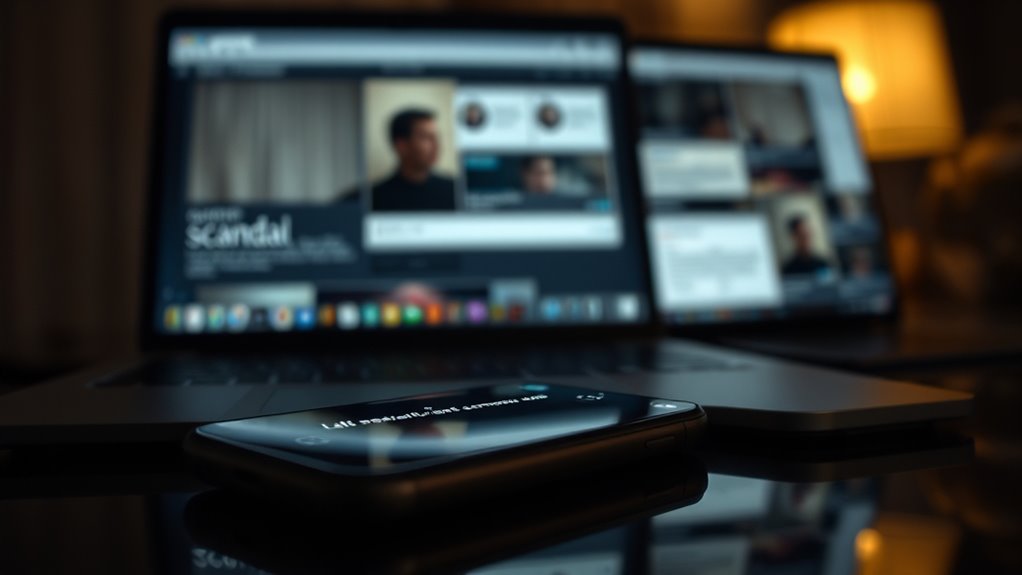Tech can easily expose cheaters through sexting and screenshots. When you send private messages or photos, you lose control of that content once it leaves your device. Screenshots can be taken without your knowledge and shared widely, turning secrets into public scandals fast. Metadata and digital footprints further increase exposure risks, making privacy difficult to maintain. If you keep going, you’ll discover how these digital pitfalls can catch even the most careful cheaters.
Key Takeaways
- Screenshots can capture private content without consent, making secret exchanges easily public.
- Digital data can be recovered or stored, so deleted messages are not truly erased.
- Metadata may reveal personal details, increasing the risk of exposure during sharing.
- Once content leaves a device, controlling its spread becomes nearly impossible.
- Sharing intimate content digitally can lead to scandals, harassment, and lasting reputation damage.

In today’s digital age, sexting has become a common way for people to express intimacy, but it also comes with serious risks. When you send intimate messages or photos, you might think they’re private, but the reality is far from that. Once you hit send, you lose control over where that content might go. Digital data is vulnerable, and even if you trust your partner, accidents or malicious actions can expose your private moments. Screenshots are the biggest threat to your privacy. No matter how careful you are, someone can capture your messages or images without your knowledge. A simple screenshot can turn a private exchange into public gossip in seconds, especially if your partner or someone else gets hold of it.
Technology makes it incredibly easy for screenshots to be taken, stored, and shared. Some apps warn you if a screenshot is taken, but many do not. Even if you think your messages are secure, there’s always a way for someone to record or screenshot them. Once your intimate content is captured, it can spread beyond your control — shared through social media, forwarded via messaging apps, or posted in online forums. This can lead to devastating consequences, including damage to your reputation, emotional distress, or even harassment. Many people have experienced how quickly private photos or messages can become public scandals, often with long-lasting repercussions. Additionally, the transient nature of digital communication does not guarantee that deleted content is permanently gone, as data recovery tools can often retrieve erased information. Content security and privacy measures are essential to protect sensitive information in the digital age. This means that what seems like a discreet affair can be exposed if someone digs deep enough.
Screenshots can spread private content instantly, risking reputation, distress, and long-lasting scandals. Stay cautious with your digital intimacy.
The worst part is, once leaked, your private content can go viral quickly. You might wake up one day to find your intimate photos or messages plastered across social media, with no way to undo the damage. It highlights how vulnerable you are in the digital age, where privacy is fragile and trust can be broken in an instant. So, while sexting might seem like an exciting way to connect, you need to consider the long-term risks. The truth is, once your digital intimacy leaves your device, it can be nearly impossible to control where it ends up. Being aware of digital footprints and how data can be stored or recovered is crucial to understanding the full scope of potential exposure. Moreover, understanding the data recovery tools available can help you grasp how seemingly deleted content may still be accessible to others. Recognizing the risks of digital sharing is vital for safeguarding your privacy and well-being.
In addition, many people underestimate how easily metadata can be associated with shared content, revealing more about the sender than they realize.
Frequently Asked Questions
Can Cheaters Erase Digital Evidence Permanently?
You might think cheaters can erase digital evidence permanently, but that’s rarely the case. Tech tools often leave traces, like metadata or backups, that can be recovered even if they try deleting files. When you delete something, it doesn’t always vanish completely; recovery software can often retrieve deleted messages or images. So, if you’re worried about digital footprints, remember that virtually nothing is truly erased forever.
What Legal Actions Can Victims Take Against Digital Infidelity?
If you’re dealing with digital infidelity, you can take legal actions like filing for a restraining order or seeking a divorce based on infidelity. You might also pursue claims for emotional distress or breach of privacy. Gather evidence such as messages, screenshots, or other digital proof to support your case. Consult a lawyer to understand your options and get tailored advice for your situation.
How Can Individuals Protect Their Privacy Online?
You can protect your privacy online by using strong, unique passwords for each account and enabling two-factor authentication. Be cautious about what you share and who you share it with, avoiding sensitive information on unsecured sites. Regularly update your software to patch security vulnerabilities, and review your privacy settings on social media platforms. Consider using a virtual private network (VPN) to encrypt your internet traffic and stay anonymous online.
Are There Digital Tools to Detect Cheating?
Think of digital tools for detecting cheating as your digital detective squad. Many apps monitor activity, flag suspicious messages, or track device usage patterns, acting like a watchful eye. You can use spyware or monitoring software, but remember, these tools come with privacy and legal risks. Always prioritize open communication, but if you suspect dishonesty, these tools might help you gather clues carefully and responsibly.
What Psychological Effects Do These Scandals Have on Relationships?
When trust is broken in your relationship, you might feel betrayed, anxious, or unsure about your future together. These scandals can cause deep emotional pain, leading to resentment or insecurity. You may struggle to rebuild confidence or intimacy, and trust issues might linger even after the scandal is exposed. It’s common to experience a mix of anger, sadness, and doubt as you navigate the aftermath and consider forgiveness or moving on.
Conclusion
As you scroll through these stories, it’s almost as if technology’s silent watchful eye was waiting for the perfect moment to expose secrets. Coincidences like a lost phone or a forgotten screenshot reveal more than intended, reminding you that no digital act is truly private. So, as tempting as it is to play with fire online, remember—what happens in the digital shadows might just surface when you least expect it. Stay cautious; digital footprints never fade completely.









